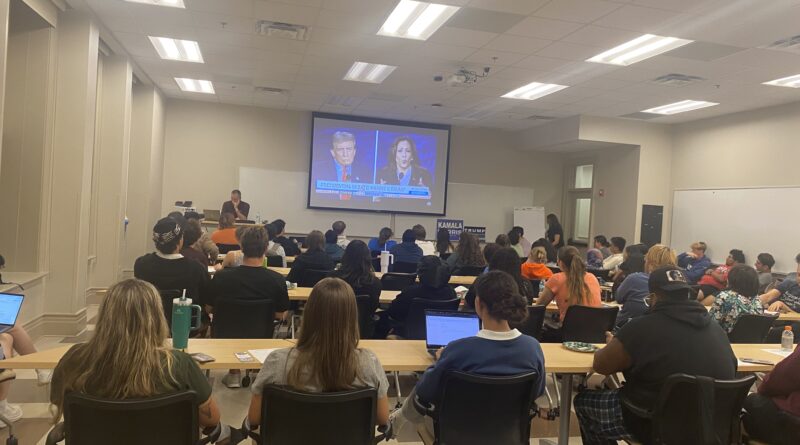With election season underfoot, MC students receive encouragement to become informed voters
In order to encourage students to be politically engaged, a non-partisan debate watch party was hosted on campus for the Harris v. Trump debate on Sept. 10. While acknowledging the political lean on campus, Political Science Professor Dr. Mark O’Gorman emphasized that non-partisanship was critical to this event.
“Students in the room had informal conversations with me or turned in papers after the debate, [and] I saw folks who were more conservative, more amenable to former president Trump’s comments – they were in the room, too,” said O’Gorman. “There was tangible bi-partisanness in the room, which was pleasing to me.”
This debate watch party is just one example of election engagement efforts led by students and professors who want to see MC students at the polls. O’Gorman and other members of the social sciences department are working to convey relevant information and resources to students.
Informed voting remains the top priority in an election like this. “Public Policy” and “American Political Processes” classes are being taught this semester, as well as a “Political Sociology” course. These are purposefully scheduled to align with the election cycle and engage student voters. Additionally, tablings outside of Pearson’s and Isaac’s offer information on voter registration and links to helpful resources.
“So much responsibility is placed on the voter,” said O’Gorman. “Will they take the time to lean in on that comment and get some information behind it?”
While fact-checking by third-party organizations occurred throughout the debate, voters cannot rely on any one source to be fully informed. Even after a debate like this, some public responses echoed the opinion that the fact-checking was one-sided, creating a narrative for how the debate went. Political Science major Josh Cornell (‘26) noticed misinformation from both parties.
“I don’t think there was one side stating the absolute truth. There were lies by both sides during the debate,” said Cornell. “I think at one point the tally was Harris with two, Trump with 33.”
Especially when it comes to the increased use of social media campaigning and the spread of news on these sites, reliable and trustworthy information is scarce.
“If you are getting the majority of your information from a screen, you are probably being misled,” said Dr. Andrew Gunnoe, professor of sociology at MC.
He added that the spectacle of the debate—the visual, the illusion—can be deceptive.
In Gunnoe’s political sociology class at MC, modern politics has been compared to performance art. This is due to the role that social media plays in the lives of voters and in the campaigns of candidates. Even for those who didn’t watch, the “highlights” on social media in the days following the debate represented aspects of this election that are too easily accepted.
Rather than focusing only on the importance of a topic, the media takes bits and pieces that are entertaining, throwing them up again and again on social media. Memes focusing on a few of the statements made circulated the internet: those about pets in Springfield, Ohio being eaten, or the loose reference to “transgender operations on illegal aliens in prisons.”
Multiple bomb threats in Springfield have led to schools closing due to fear that their Haitian immigrant populations will be targeted after the accusations made against them by former president Trump. The repercussions of this incident give insight into the issue of disinformation and the necessity of reliable and trustworthy news.
All of these are issues that are further exacerbated by the decreased attention spans of viewers, and the format of the debate, which limits how much depth a candidate is able to provide.
“The average sound bite related to a political issue has dropped to 12 seconds,” said O’Gorman, adding that you can’t really cover anything of substance in two minutes, either.
“The media, if given the choice between trying to create controversy or providing a longer discussion of a certain policy debate, is probably keeping one eye on ratings and one eye on trying to inform the citizen,” O’Gorman said.
“Don’t let the cynicism and the idea that voting doesn’t matter prevent you from being engaged,” said Gunnoe.
Getting students to the polls is important, especially in an election like this one.
Cornell estimates around 75% of MC students will vote in the upcoming election. He added that he thinks this number will be higher than we have seen previously due to the accessibility of the Chilhowee Club and student-led programs to get people out to vote.
O’Gorman seconded this, adding that the “somewhat” educated college voter is more likely to vote than the average Gen Z voter. While it is hard to gauge the numbers in recent years, as Covid increased accessibility and prevalence of at-home voting, O’Gorman also hopes we continue to see an upward trend.
For MC students looking to find ways to get more engaged in the election or stay informed on the debate, a room will be reserved for the vice presidential debate watch party. It will be CBS moderated, hosted on Tuesday, Oct. 1, and open to all students.

